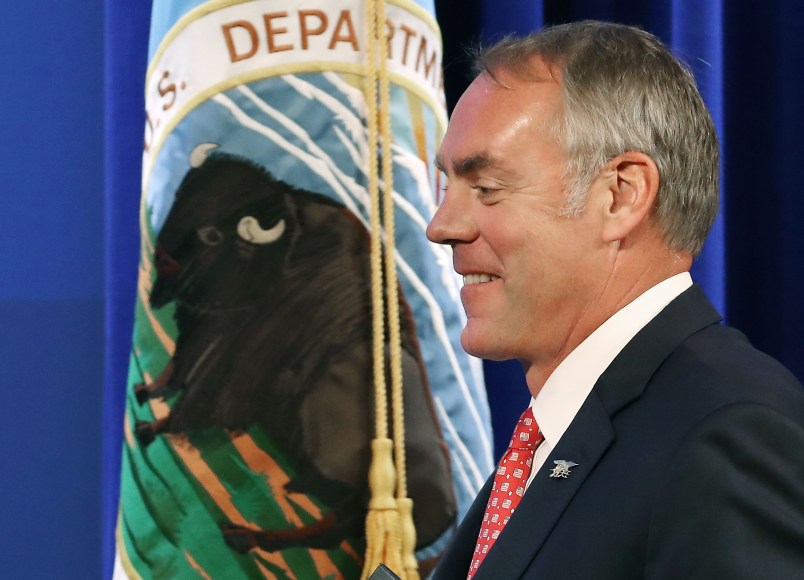A full third of the senior Interior Department (DOI) career officials reassigned under Secretary Ryan Zinke in a major agency reshuffling are Native American, even though Native Americans make up less than 10 percent of the Department’s workforce, a review by TPM has found.
The finding comes days after Democratic lawmakers demanded an investigation into whether Zinke discriminated when he reassigned 33 career officials last summer, and follows on reports that Zinke has repeatedly told DOI officials he doesn’t care about diversity — which prompted one member of Congress to accuse Zinke of working to create a “lily-white department.”
Former government officials tell TPM that they see the reassignment of top Native American staffers as part of an effort to remove internal opposition to Zinke’s plan to open up more tribal and public lands to the fossil fuel industry.
Thanks to a Freedom of Information Act lawsuit filed by Katherine Atkinson, a lawyer for ousted DOI climate scientist Joel Clement, the agency has begun to release emails and other documents related to the reassignments, including a list of the 33 reassigned officials.
Government documents and news reports reviewed by TPM show that at least 11 are members of Native tribes. The list includes workers who have served in government for many years, like Chickasaw Nation member Stanley Speaks, Oglala Sioux member Michael Black, and Miami Nation member Darren Cruzan.
Several others on the list are Black and Latino, online records show.
“I am particularly concerned that the employees affected were disproportionately minority,” Sen. Tom Udall (D-NM), the top Democrat on the Senate Indian Affairs Committee, told TPM in a statement. “The diversity of a government workforce is a good thing and should be celebrated not denigrated, particularly for agencies such as the Department of the Interior, whose workforce should represent the broad geographic diversity of the people it serves.”
The Interior Department did not respond to TPM’s inquiry as to why Native American workers were disproportionately represented on the reassignment list. The agency previously denied reports that Zinke made comments dismissing the importance of hiring a diverse workforce.
The DOI reassignments are currently under investigation by several government agencies, including the Government Accountability Office, the Interior Department’s Inspector General, and the Office of Special Counsel.
Singling workers out for political reasons or because of their race would violate federal law. Additionally, DOI’s Indian Preference rules state that the agency must give “absolute preference in employment to American Indians and Alaska Natives” in several of its offices. Those rules specifically apply to reassignments as well as hiring decisions.
“If Zinke had made his diversity comment in the private sector, it would have been one thing, but the Interior Department actually has a legal obligation to diversity,” Atkinson said. “Interior is supposed to prioritize hiring Native Americans, not push them out.”
The mass reassignment of Native American senior officials comes amid ongoing tension between tribal groups and Secretary Zinke. The secretary has launched an effort to open up land that is sacred to Native Americans for drilling, mining, and logging, and endorsed President Trump’s budget, which would have slashed half a billion dollars from the Bureau of Indian Affairs.
Bryan Newland, who served as a senior policy adviser at the BIA under the Obama administration, and is now the tribal chairman of the Bay Mills Indian Community in Michigan, sees the disproportionate reassignment of the veteran BIA officials he worked with as part of a bigger effort to remove barriers to those extractive industries.
“If you have experienced people who understand the U.S. government’s responsibility to Indian tribes, they’re more likely to stand up and say, ‘Hey, we have an obligation to our 567 tribes, and you can’t just open everything up to mining and drilling,'” said Newland. “Those folks were moved to get them out of the way so that the oil- and gas-centric policy can move quickly.”
Under the Trump administration, Interior Department agencies that serve Native Americans have also been plagued by understaffing and leadership vacancies. Trump’s nominee to lead the BIA has sat unconfirmed for months due to an ethics investigation into her possible conflicts of interest. And Trump’s pick to run the Indian Health Service (IHS) withdrew his nomination in February after reporters found he lied on his resume. A GAO report last summer found more than 1,500 vacancies in the IHS alone, as well as severe staff shortages across the bureau’s other offices, leading to years-long delays for tribes applying for federal grants and projects.
Newland told TPM that the backlog has personally impacted his community.
“We had a request for funding pending at the DOI for more than a year,” he said. “It’s a fairly routine request, but it just sat there. We recently heard that it finally made its way to political leadership at Indian Affairs, so I called them, and I learned our request had been denied. We never received anything in writing. There’s just a lack of person-hours to handle these requests, so they are going unaddressed.”
“I think it’s intentional,” Newland added. “If something is a priority, you spend time on it. You put good people on it. They’re not spending time on it.”







As we keep saying, our country is becoming more and more “tribal.” Unfortunately, true native tribes are not recognized by the frightening transition in our country’s mind set.
Had no idea this ethnic cleansing was going on from Day 1 of Zinke’s tenure. I do hope he loses his job, those workers sue to get their jobs back + damages and Congress (read: Democrats) make the Trump pay for this terrible Nazi-like excess (Godwin’s Law temporarily suspended).
It’s those damn white immigrants. The long sad history continues.
Make America White Again!
Right?